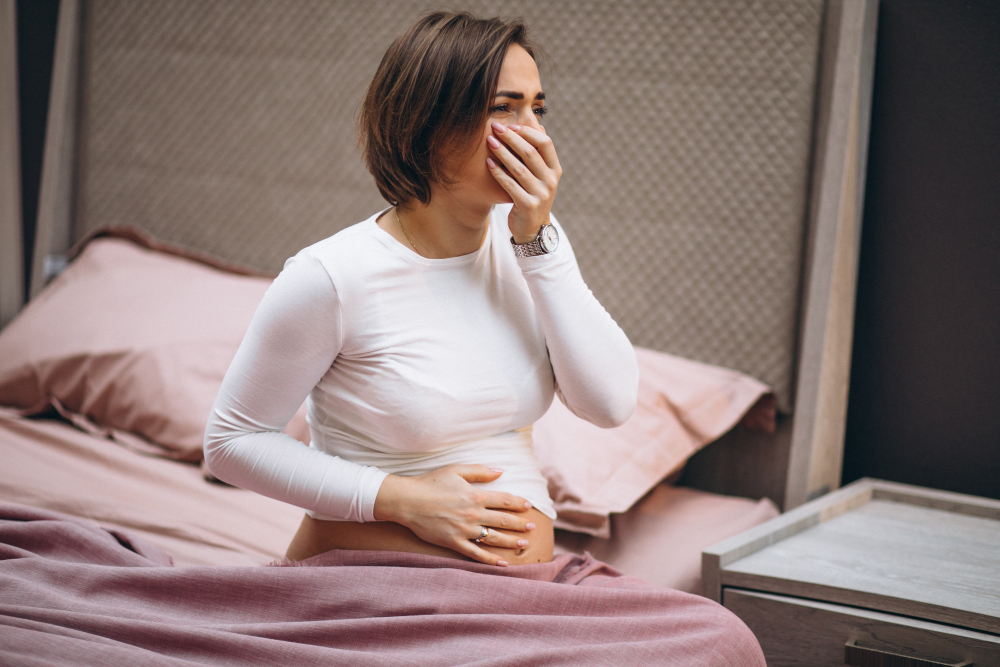Safe Days for Intimacy After Menstruation/ Period
Exploring the timing of intimacy after menstruation is a topic of significant importance for individuals seeking to prevent unplanned pregnancies. Understanding the nuances of your menstrual cycle and the window of fertility is essential in making informed decisions about when it’s safer to engage in sexual activity without the risk of conception. While the days immediately following your period are generally considered less fertile, it’s crucial to delve deeper into the complexities of your cycle for a more accurate assessment.
The menstrual cycle encompasses various phases, with ovulation being the pivotal point where conception becomes more likely. This phase occurs around the middle of the cycle, but it can vary depending on factors like cycle length and hormonal fluctuations. The first week after menstruation is often regarded as a period with lower fertility due to the maturation process of the egg. However, it’s essential to note that sperm can survive in the reproductive tract for up to five days, adding complexity to predicting fertile and safe days solely based on calendar calculations.
To make informed choices about intimacy while avoiding pregnancy, considering your cycle’s unique characteristics and employing additional contraception methods is advisable. This article delves into the intricacies of the menstrual cycle, factors influencing fertility, and how to best identify safer days for sexual activity following menstruation. Remember, consulting a healthcare professional can provide personalized guidance to ensure your chosen approach aligns with your reproductive goals and overall well-being.
Must Read: How to Get Periods/ Menstruation Quickly in One Hour: Myths and Reality
Understanding the Different Phases of the Menstrual Cycle
1. Menstrual Cycle Phases:
The menstrual cycle typically comprises four phases – menstrual, follicular, ovulatory, and luteal. The ovulatory phase, when an egg is released from the ovary, is the most fertile time for conception.
2. Post-Menstrual Phase:
During the menstrual phase, the uterine lining sheds, and the menstrual bleeding occurs. In the immediate days after your period, the chances of conception are minimal due to the absence of a mature egg.
3. Fertile Window:
For most women, the fertile window occurs around the ovulation period. It’s usually about 14 days before the start of the next menstrual period. However, this can vary based on cycle length.
4. Cycle Variability:
Menstrual cycles can range from 21 to 35 days or more. Ovulation may occur earlier or later, affecting the safe days to avoid pregnancy.
5. Tracking Ovulation:
Charting your cycle, using ovulation prediction kits, and monitoring cervical mucus changes can help identify your fertile days more accurately.
6. Safe Days:
As a general rule, the first week after your period is considered less fertile. However, it’s not a foolproof method as sperm can survive in the body for up to five days.
7. Additional Methods:
For effective pregnancy prevention, consider combining methods like barrier contraceptives, hormonal methods, or intrauterine devices.
8. Consult a Professional:
If you’re unsure about your cycle or have irregular periods, consult a healthcare provider for personalized guidance.
Must Read: 2/ 5 मिनट में पीरियड्स को जल्दी कैसे लाएं | पीरियड लाने का उपाय: क्या यह पॉसिबल है?
What is Safe Period?
A safe period, also known as the fertility awareness method or natural family planning, refers to a specific timeframe within a woman’s menstrual cycle when the likelihood of conception is relatively low. It is based on the understanding that conception is most likely to occur during the fertile window – the days around ovulation when an egg is released from the ovary and can be fertilized by sperm.
The safe period method involves tracking your menstrual cycle and identifying the days when you are less likely to conceive. This typically includes the days immediately after menstruation and a few days before ovulation. However, it’s important to note that this method is not foolproof and requires a thorough understanding of your individual cycle.
To use the safe period method effectively, you need to have a regular menstrual cycle and track it over several months to identify patterns. Factors such as stress, illness, and lifestyle changes can affect the accuracy of this method. Additionally, sperm can survive in the female reproductive tract for up to five days, which means that even if you have unprotected intercourse during your perceived safe period, pregnancy is still possible.
While the safe period method can be used as a natural contraceptive approach, it is less reliable compared to modern contraceptive methods like condoms, birth control pills, or intrauterine devices. If you are considering using the safe period method for contraception, it’s recommended to consult a healthcare professional to ensure you understand the method’s limitations and potential risks.
A safe period, also known as the fertility awareness method or natural family planning, refers to a specific timeframe within a woman’s menstrual cycle when the likelihood of conception is relatively low. It is based on the understanding that conception is most likely to occur during the fertile window – the days around ovulation when an egg is released from the ovary and can be fertilized by sperm.
The safe period method involves tracking your menstrual cycle and identifying the days when you are less likely to conceive. This typically includes the days immediately after menstruation and a few days before ovulation. However, it’s important to note that this method is not foolproof and requires a thorough understanding of your individual cycle.
To use the safe period method effectively, you need to have a regular menstrual cycle and track it over several months to identify patterns. Factors such as stress, illness, and lifestyle changes can affect the accuracy of this method. Additionally, sperm can survive in the female reproductive tract for up to five days, which means that even if you have unprotected intercourse during your perceived safe period, pregnancy is still possible.
While the safe period method can be used as a natural contraceptive approach, it is less reliable compared to modern contraceptive methods like condoms, birth control pills, or intrauterine devices. If you are considering using the safe period method for contraception, it’s recommended to consult a healthcare professional to ensure you understand the method’s limitations and potential risks.
How can you calculate the days considered safe after your menstrual period?
Counting the safe days after your period involves tracking your menstrual cycle and identifying the days when the likelihood of conception is lower. Here’s a step-by-step guide on how to count the safe days after your period:
Know Your Cycle Length: Calculate the length of your menstrual cycle. The menstrual cycle starts from the first day of your period and ends on the day before your next period begins. A regular cycle is typically around 28 days, but it can vary from person to person.
Determine Your Fertile Window: The fertile window is the timeframe around ovulation when conception is most likely to occur. Ovulation usually happens around the middle of the menstrual cycle, roughly 14 days before your next period starts.
Identify the Safe Days: To calculate the safe days after your period, subtract the length of your fertile window from the total length of your cycle. For example, if you have a 28-day cycle and your fertile window is around 6 days, you would subtract 6 from 28, leaving you with 22 days.
Consider Variability: Keep in mind that menstrual cycles can vary in length from month to month. Factors like stress, illness, and lifestyle changes can impact the timing of ovulation. To be more accurate, track your cycle over several months to identify any patterns.
Use Additional Methods: While counting safe days can be a natural approach to contraception, it’s not foolproof.Sperm can remain viable within the female reproductive tract for as long as five days, which raises the potential for conception to occur. Consider using additional contraceptive methods like condoms or fertility awareness methods (like tracking cervical mucus changes or basal body temperature) to enhance effectiveness.
Consult a Professional: If you’re new to tracking your cycle or have irregular periods, consult a healthcare provider for guidance. They can help you understand your cycle better and provide personalized advice.
Remember that the safe days method requires diligence and consistency in tracking your cycle. If preventing pregnancy is a priority, consider combining this approach with other reliable contraceptive methods for optimal effectiveness.
Is it Safe to Have Sex After Periods?
Having sex after your period is generally considered to be safer in terms of the likelihood of pregnancy, especially in the immediate days following menstruation. During your period, the uterine lining is shed, and any potential egg that could have been fertilized is typically expelled. However, it’s important to understand that the concept of “safe” is relative and depends on various factors.
Here are a few things to consider having Sex After Periods:
Fertility Window: While the immediate days after your period are less fertile, it’s important to remember that sperm can survive in the female reproductive tract for up to five days. If you have a shorter menstrual cycle, your fertile window could begin sooner.
Cycle Variability: Menstrual cycles can vary in length from person to person and even from month to month. This can impact the timing of ovulation and increase the risk of pregnancy if you miscalculate your fertile days.
Contraception: If you want to avoid pregnancy, it’s advisable to use additional contraceptive methods, such as condoms or hormonal birth control, along with tracking your cycle. These methods provide more reliable protection.
Sexually Transmitted Infections (STIs): Even if you’re not concerned about pregnancy, it’s important to remember that engaging in unprotected sex can still expose you to the risk of STIs. Using barrier methods like condoms helps protect against both pregnancy and STIs.
Consult a Professional: If you’re unsure about your cycle or have concerns about contraception, it’s a good idea to consult a healthcare provider. Based on your specific situation, they can offer customized advice and recommendations.
Ultimately, if you’re sexually active and want to prevent pregnancy, relying solely on the timing of your menstrual cycle may not provide sufficient protection. Combining cycle tracking with other reliable contraceptive methods is recommended for more effective contraception.
Is it Safe to Have Sex During Periods?
Certainly, engaging in sexual activity during your menstrual period is generally considered safe. Nevertheless, there are several factors to take into account:
Personal Comfort: Some people may feel uncomfortable or less inclined to have sex during their period due to factors like menstrual cramps, heavy flow, or personal preferences. Maintaining open communication with your partner and placing emphasis on your comfort is crucial.
Protection: While the risk of pregnancy is lower during your period, it’s not impossible. Sperm can survive in the female reproductive tract for up to five days, so if you have a shorter menstrual cycle, there is a chance that you could ovulate soon after your period ends. If you want to prevent pregnancy, it’s advisable to use contraception.
Sexually Transmitted Infections (STIs): Having unprotected sex, even during your period, can still expose you to the risk of STIs. Using barrier methods like condoms helps protect against both pregnancy and STIs.
Messiness: It’s important to be aware that having sex during your period can be messy due to menstrual blood. If this is a concern for you or your partner, you can lay down a towel or consider having sex in the shower.
Hygiene: Good hygiene practices are essential, both for your comfort and to reduce the risk of infection. Make sure to clean yourself and your partner before and after intercourse.
Communication: Open communication with your partner is crucial. Discuss your feelings, preferences, and any concerns you may have about having sex during your period.
Consult a Professional: If you have any medical conditions, such as infections or menstrual disorders, or if you’re uncertain about having sex during your period, it’s recommended to consult a healthcare provider.
Ultimately, whether or not to have sex during your period is a personal decision. As long as both partners are comfortable, informed, and practicing safe sex, it can be a mutually satisfying and safe experience.
Must Read: Expert Tips – How to Look Beautiful Naturally
1. Can I have sex immediately after my period?
Yes, the immediate days after your period are generally considered less fertile. However, it’s essential to consider cycle variability and use additional contraception methods for optimal safety.
2. How many days after my period are safe to avoid pregnancy?
The number of safe days varies based on your menstrual cycle length and fertility window. On average, the first week after your period is considered less fertile, but tracking your cycle and using contraception methods are recommended.
3. Is it possible to get pregnant right after my period?
While the chances are relatively low, it’s not impossible. Sperm can survive in the female reproductive tract for up to five days, increasing the risk if you have a shorter cycle or early ovulation.
4. What other contraception methods should I use during safe days?
To enhance effectiveness, consider using barrier methods like condoms or fertility awareness methods. Combining approaches provides better protection against pregnancy.
5. Can my menstrual cycle length impact safe days calculation?
Yes, irregular cycles or variations in cycle length can affect the accuracy of safe days calculation. Tracking your cycle over several months and consulting a healthcare provider can offer more precise guidance.
Must Read: Choosing the Best Sanitary Pads for Travel: Ensuring Comfort and Confidence on the Go






